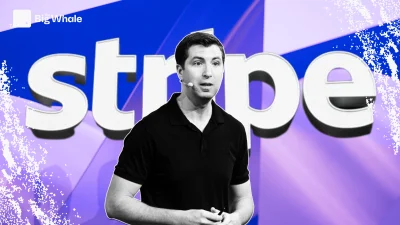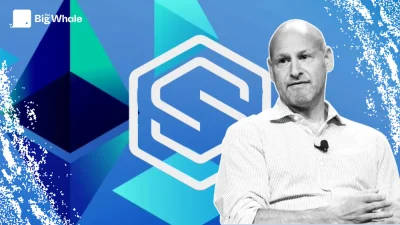The Big Whale: You recently obtained your PSAN registration to operate exchange and storage services, what are your plans?
Fatih Balyeli: Exaion is already very active in blockchain, notably with the management of RPC nodes, validation nodes and archives. We have developed a staking activity internally, but without offering it to the general public. Today, we are seeing a significant increase in market requirements, particularly with the gradual entry of major banking institutions and investment funds, thanks in particular to the Bitcoin and Ethereum ETFs.
These players need a trusted third party capable of supporting them on both the technical side and asset custody. From the second half of 2025, we will be offering a complete service including custody, staking, fiat-crypto, crypto-fiat and crypto-crypto swap (read our dedicated article).
Can we say that Exaion is becoming an institutional broker?
No, we don't want to position ourselves as a financial player. Our mission is to provide a highly secure infrastructure enabling financial institutions to develop their own blockchain activities. We offer custody and infrastructure services, but we don't conduct financial activities directly.
So custody is the core of your new offering?
Yes, custody of digital assets is a key issue for financial institutions looking to enter the crypto ecosystem securely. Today, the offering on the market is fragmented, with players offering staking without providing an adequate custody service. At Exaion, we have chosen to integrate these services in a coherent and secure way to offer a complete package: custody, staking and swap.
This enables our institutional clients to benefit from a reliable solution that complies with regulatory requirements, without multiplying intermediaries or compromising the security of their assets.
>> Read also - EDF manages over 150 Ethereum nodes
Do you develop your own technical stack or work with partners such as Fireblocks, Dfns, Ledger or others?
We chose to develop our own technical stack in order to guarantee total sovereignty over our infrastructures and complete control over security aspects. This enables us to adapt our solutions to the strict requirements of financial institutions while retaining flexibility in terms of technological evolution.
However, we remain open to partnerships if complementary solutions can enhance our offering without compromising our independence and security standards.
Our customers are looking for a robust infrastructure that allows them to manage their digital assets without exposing themselves to the risks of uncertified startups
You use an HSM approach for custody. Why this choice rather than MPC?
We opted for HSM because it meets the expectations of the major financial institutions we work with. These players favour this technology because it is proven, complies with the most demanding cybersecurity standards and is recognised by regulators.
Although MPC is gaining in popularity, its institutional adoption is still limited due to questions about its long-term robustness and regulatory compliance. Nevertheless, we are closely monitoring market developments and remain open to technological innovations if they prove relevant to our offering.
>> The Big Whale Report: All about the future of wallets and crypto custody
What type of customers are you targeting?
Our services are primarily aimed at major banking institutions, leading intermediaries in the crypto-asset market and investment funds wishing to enter this ecosystem while complying with strict compliance and security standards. Many traditional players are currently held back by the lack of sovereign and regulated solutions, which is where we stand out.
Our customers are looking for a robust infrastructure, operated by a recognised and secure player, that allows them to manage their digital assets without exposing themselves to the risks of uncertified start-ups or foreign solutions that do not meet European sovereignty and regulatory criteria.
What sets you apart from players who are already well established in custody?
We stand out mainly because of our sovereignty, our environmental commitment and our high level of cyber security. Unlike many international players, we offer a 100% French and European solution, meeting local regulatory requirements and guaranteeing total independence from foreign infrastructures.
In addition, we have a highly selective approach to the assets and services we take on: we prioritise quality over quantity by focusing on robust and proven protocols.
"If one day France decided to explore the path of Bitcoin mining, we would be delighted to contribute"
Does being backed by EDF offer you an advantage?
It's a major advantage that strengthens the confidence of our institutional customers. EDF is a group renowned for its stability, operational rigour and commitment to innovative technologies. Being a subsidiary of EDF allows us to offer guarantees in terms of sovereignty, security and compliance that few market players can claim.
In addition, our infrastructure is designed to be highly secure and decarbonised, which matches the growing expectations of financial institutions in terms of environmental responsibility. In a market where scandals such as FTX have shown the risks associated with certain service providers, our link with EDF allows us to embody a trusted, transparent and regulated player, offering large companies a sustainable and reliable solution for managing their digital assets.
Which protocols will you manage at launch?
We aim to offer a rigorous selection of protocols from the launch of our custody service. We will start with a short list of around five major protocols, including Bitcoin and Ethereum, which are must-haves for institutions. We already have services linked to Bitcoin, notably with our Exaion Node solution. The only thing we don't do is mining. We also plan to integrate blockchains such as Solana, which is seeing growing adoption, as well as other networks that meet our criteria for security, robustness and technological maturity.
Our approach is to prioritise quality over quantity by focusing on ecosystems that have already proved their worth and enjoy proven institutional adoption. Thereafter, we will gradually expand our offering in line with market developments and our customers' needs, while maintaining high standards for the assets we take on.
Could EDF use its surplus renewable energy to mine Bitcoin and set up a national strategic reserve, as more and more countries seem to want to do?
This is not a decision that belongs to us directly, but would come under a national initiative involving the government and the EDF group. Technically, we have the necessary skills and infrastructure to support such a project if a decision were taken in this direction. However, using surplus energy to mine Bitcoin raises strategic, economic and regulatory issues that go beyond the scope of Exaion.
For the time being, our priority remains to offer custody and blockchain infrastructure services to institutions, guaranteeing a secure approach that complies with market requirements. If one day France decides to explore this path, we would be delighted to contribute by making our expertise and adapted infrastructures available.
>> Read also - Bitcoin and energy: are the criticisms justified?
>> Read also - "We're making a bit too much of Bitcoin's energy consumption"
Heading 1 Heading 2 Heading 3 Heading 4 Heading 5 Heading 6 Lorem ipsum dolor sit amet, consectetur adipiscing elit, sed do eiusmod tempor incididunt ut labore et dolore magna aliqua. Ut enim ad minim veniam, quis nostrud exercitation ullamco laboris nisi ut aliquip ex ea commodo consequat. Duis aute irure dolor in reprehenderit in voluptate velit esse cillum dolore eu fugiat nulla pariatur.
Block quote Ordered list
Item 1 Item 2 Item 3 Unordered list
Text link
Bold text
Emphasis
Superscript
Subscript









